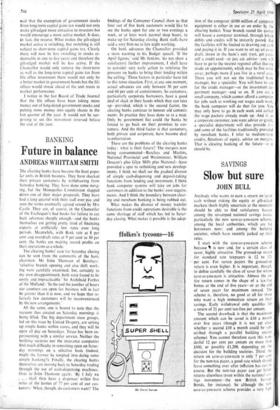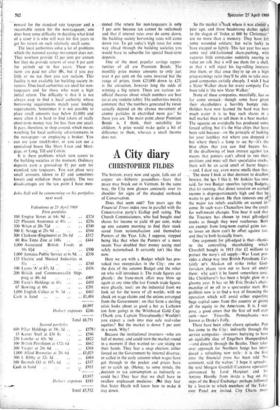Slow but sure
SAVINGS JOHN BULL
Anybody who wants to earn a return on spare cash without risking the equity or gilt-edged markets (both highly uncertain at the moment) should be able to find satisfactory havens among the revamped national savings issues, particularly the new save-as-you-earn scheme; among the local authorities, which are big borrowers . now: and among -the building societies, which have recently jacked up their rates.
I start with the save-as-you-earn scheme because it is new and, for a certain class of saver,, highly attractive. The grossed-up retain for standard rate taxpayers is 12 to l per cent. For surtax payers the grossed-up return is even higher. It is important, though. to define carefully the class of saver for whom save-as-you-earn is attractive. Almost the en- tire return comes in the shape of a tax-free bonus at the end of five years—or at the end of seven years for maximum reward. The scheme is, therefore, no good at all for those who want a high immediate return' on their savings. Early withdrawal only qualifies for a return of 2+ per cent tax-free per annum. The second drawback is that the maximum amount which can be saved is •f10 a month over five years (though it is not yet cle.i- whether a second £10 a month could be sub- scribed through a parallel building socie: scheme). You cannot therefore earn this won- derful 12 per cent per annum on more than £600, or possibly £1,200, depending on the decision for the building societies. Third. the return on save-as-you-earn is only 7 per cent for the non-tax iayer, a good rate which should leave something over after inflation has run its course. But the non-tax payer can *get better returns elsewhere (even within the national sav- ings movement—the new British Sas ingi Bonds, for instance). So although the new save-as-you-earn scheme provides a very high reward for the standard rate taxpayer and a reasonable return for the non-taxpayer,- one does have some difficulty in deciding what kind of a saver it is who will wait for five years to get -his return on such relatively small sums.
The local authorities solve a lot of problems which the national savings movement does not. They nowhere provide 12 per cent per annum but they do provide returns of over 8 per cent for periods up to five years. These re- turns are paid net after t#x, but if you pay little or no tax then you can reclaim. This facility is not available for building society in- vestors. Thus local authorities are ideal for non- taxpayers and for those who want a high initial return. The difficulty is that it is not always easy to find a local authority whose borrowing requirements match your lending requirements. Sometimes it is not possible to place small amounts (say below £1,000) and more often it is hard to find takers of really short-term money (say for less than one year). It pays, therefore, to shop around, which means watching for local authority advertisements in the newspaper—or employing a broker. You can use your stockbroker, or you can use a specialised house like Short Loan and Mort- gage, or Long, Till and Colvin.
It is these problems which turn savers to the building societies at the moment. Ordinary deposits earn a grossed-up 81 per cent for standard rate taxpayers. You can place very small amounts (down to £5 and sometimes lower) and withdraw them quickly. The two disadvantages are the tax point 1 have men-
John Bull will be commenting on his portfolios next week Valuations at 23 April 1969 First portfolio
100 Empire Stores at 64s 9d .. £324 125 Phoenix Assurance at 4Is £256 330 Witan at 20s .. • • £341) 500 E. Scragg at 21s 9d £544 500 Clarkson (Engineers) at 20s 6d .. £512 60 Rio Tinto Zinc at 148s £444 1,000 Associated British Foods at lOs • • £500 1,000 Jamaica Public Service at 6s 9d. .. £338 133 Electric and Musical Industries at 51s .. .. £340 100 Lyons 'A' at 87s 3d £436 200 British and Commonwealth Ship- ping at 40s 6d 200 Forte's Holdings at 41 s 67 Bowring at 60s 1,000 English Calico at 9s 3d ..
Cash in hand .. £6,997
Deduct: expenses £246
Total £6,751
Second portfolio
600 Pillar Holdings at 19s 3d ..
15 Kaiser Steel at £36 8s .. 250 Lonrho at 65s 9d 100 British Petroleum at 132s 6d 300 Vosper at 24s 6d 1,000 Allied Breweries at 20s 6d 300 J. Bibby at 32s 3d 100 Burmah Oil at 107s 6d ..
Cash in hand . £5,937
Deduct: expenses £185
Total f5,752 £405 £410 .. £201 .. £463 .. £1,484 .. £5787 .. £546 .. £822 .. £662 .. £368 .. £1,025 .. £484 .. £537 .. £915 • --tinned (the return for non-taxpayers is only 5 per cent because tax cannot be reclaimed) and that if interest rates ever do come down, the building society borrowing rates will come down too. To get today's high rates for some way ahead through the building societies you would have to subscribe for special fixed-term deposits.
One of the most popular savings oppor- tunities of all are Premium Bonds. The monthly prize money amounts to only just over 4 per cent on the sums invested but the range of prizes, from £25,000 down to £25, is the attraction, however long the odds of winning a big return. There are various un- official theories about which numbers are best (as at any roulette table). The authorities merely comment that 'the numbers generated by ERNIE actually depend on the chance movement of atomic- particles in electrified neon gas.' So there you are. The main point about Premium Bonds is, I think, their . suitability for children. A prize would make quite a bit of difference to them, whereas a small income does not.











































 Previous page
Previous page